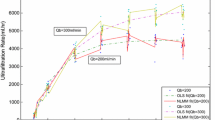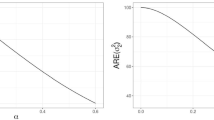Abstract
In this paper we consider the problem of adaptive estimation of random-effects densities in linear mixed-effects model. The linear mixed-effects model is defined as Y k,j = α k + β k t j + ɛ k,j , where Y k,j is the observed value for individual k at time t j for k = 1, …,N and j = 1, …, J. Random variables (α k , β k ) are called random effects and stand for the individual random variables of entity k. We denote their densities f α and f β and assume that they are independent of the measurement errors (ɛ k,j ). We introduce kernel estimators of f α and f β and present upper risk bounds. We also compute examples of rates of convergence. The focus of this work lies on the near optimal data driven choice of the smoothing parameter using a penalization strategy in the particular case of fixed interval between times t j . Risk bounds for the adaptive estimators of f α and f β are provided. Simulations illustrate the relevance of the methodology.
Similar content being viewed by others
References
L. Birgé, “An Alternative Point of View on Lepski’s Method”, in State of the Art in Probability and Statistics: Festschrift for Willem R. van Zwet, IMS Lecture Notes-Monograph Series (1999), pp. 113–133.
L. Birgé and P. Massart, “From Model Selection to Adaptive Estimation”, in Festschrift for Lucien Le Cam (Springer, 1997), pp. 55–87.
C. Butucea, “Deconvolution of Supersmooth Densities with Smooth Noise”, Canad. J. Statist. 32(2), 181–192 (2004).
C. Butucea and F. Comte, “Adaptive Estimation of Linear Functionals in the Convolution Model and Applications”, Bernoulli 15(1), 69–98 (2009).
C. Butucea and A. B. Tsybakov, “Sharp Optimality in Density Deconvolution with Dominating Bias I”, Theory Probab. Appl. 52(1), 24–39 (2008).
C. Butucea and A. B. Tsybakov, “Sharp Optimality in Density Deconvolution with Dominating Bias II”, Theory Probab. Appl. 52(2), 237–249 (2008).
R. J. Carroll and P. Hall, “Optimal Rates of Convergence for Deconvolving a Density”, J. Amer. Statist. Assoc. 83(404), 1184–1186 (1988).
G. Claeskens and J. D. Hart, “Goodness-of-Fit Tests inMixed Models”, TEST 18(2), 213–239 (2009).
F. Comte and C. Lacour, “Data-Driven Density Estimation in the Presence of Additive Noise with unknown distribution”, J. Roy. Statist. Soc.: Ser. B 73(4), 601–627 (2011).
F. Comte, Y. Rozenholc, and M.-L. Taupin, “Penalized Contrast Estimator for Adaptive Density Deconvolution”, Canad. J. Statist. 3, 431–452 (2006).
F. Comte, Y. Rozenholc, and M.-L. Taupin, “Finite Sample Penalization in Adaptive Density Deconvolution”, J. Statist. Comput. Simul. 77(11), 977–1000 (2007).
F. Comte and A. Samson, “Nonparametric Estimation of Random-Effects Densities in Linear Mixed-Effects Model”, J. Nonparam. Statist. 24(4), 951–975 (2012).
F. Comte, A. Samson, and J. Stirnemann, “Deconvolution Estimation of Onset of Pregnancy with Replicate Observations”, Scand. J. Statist. 41(2), 325–345 (2013).
I. Dattner, M. Rei-, and M. Trabs, “Adaptive Quantile Estimation in Deconvolution with Unknown Error Distribution”, Preprint, arXiv:1303.1698, Bernoulli (2013) (in press).
A. Delaigle and I. Gijbels, “Bootstrap Bandwidth Selection in Kernel Density Estimation from a Contaminated Sample”, Ann. Inst. Statist. Math. 56(1), 19–47 (2004).
A. Delaigle, P. Hall, and A. Meister, “On Deconvolution with Repeated Measurements”, Ann. Statist. 36(2), 665–685 (2008).
C. Dion, “New Adaptive Strategies for Nonparametric Estimation in Linear Mixed Models”, J. Statist. Plann. Infer. 150, 30–48 (2014).
S. Efromovich, “Density Estimation for the Case of Supersmooth Measurement Errors”, J. Amer. Statist. Assoc. 92, 526–535 (1997).
J. Fan, “On the Optimal Rates of Convergence for Nonparametric Deconvolution Problems”, Ann. Statist. 19(3), 1257–1272 (1991).
W. Ghidey, E. Lesaffre, and P. Eilers, “Smooth Random Effects Distribution in a Linear Mixed Model”, Biometrics 60(4), 945–953 (2004).
A. Goldenshluger and O. Lepski, “Bandwidth Selection in Kernel Density Estimation: Oracle Inequalities and Adaptive Minimax Optimality”, Ann. Statist. 39(3), 1608–1632 (2011).
J. G. Ibrahim and K. P. Kleinman, “Semiparametric Bayesian Methods for Random Effects Models”, in Lecture Notes in Statist., Vol. 133: Practical Nonparametric and Semiparametric Bayesian Statistics (Springer, New York, 1998), pp. 89–114.
J. Johannes, “Deconvolution with Unknown Error Distribution”, Ann. Statist. 37(5a), 2301–2323 (2009).
J. Johannes and M. Schwarz, “Adaptive Circular Deconvolution by Model Selection under Unknown Error Distribution”, Bernoulli 19(5A), 1576–1611 (2013).
J. Kappus, “Adaptive Nonparametric Estimation for Lévy Processes Observed at Low Frequency”, Stoch. Proc. and Appl. 124, 730–758 (2014).
J. Kappus and G. Mabon, “Adaptive Density Estimation in Deconvolution Problems with Unknown Error Distribution”, Electron. J. Statist. 8(2), 2879–2904 (2014).
A. Komárek and E. Lesaffre, “Generalized Linear Mixed Model with a Penalized Gaussian Mixture as a Random Effects Distribution”, Comput. Statist. Data Anal. 52(7), 3441–3458 (2008).
T. Li and Q. Vuong, “Nonparametric Estimation of the Measurement Error Model Using Multiple Indicators”, J. Multivar.Anal. 65, 139–165 (1998).
P. Massart, Concentration Inequalities and Model Selection, in Lecture Notes in Mathematics, Vol. 1896: Lectures from the 33rd Summer School on Probability Theory, Saint-Flour, July 6–23, 2003 (Springer, Berlin, 2003).
A. Meister, Deconvolution Problems in Nonparametric Statistics, in Lecture Notes in Statistics (Springer, Berlin, 2009), Vol. 193.
M. N. Neumann, “Deconvolution from Panel Data with Unknown Error Distribution” J. Multivar. Anal. 98(10), 1955–1968 (2007).
M. N. Neumann and M. Reiß, “Nonparametric Estimation for Lévy Processes from Low Frequency Observations”, Bernoulli 15(1), 223–248 (2009).
M. H. Neumann, “On the Effect of Estimating the Error Density in Nonparametric Deconvolution”, J. Nonparam. Statist. 7(4), 307–330 (1997).
M. Pensky and B. Vidakovic, “AdaptiveWavelet Estimator for Nonparametric Density Deconvolution”, Ann. Statist. 27(6), 2033–2053 (1999).
J.C. Pinheiro and D.M. Bates, Mixed-EffectModels in S and Splus, inStatistics and Computing Series (Springer, New York, NY, 2000).
W. Shen and T. A. Louis, “Empirical Bayes Estimation via the Smoothing by Roughening Approach”, J. Comput. Graph. Statist. 8(4), 800–823 (1999).
L. A. Stefanski, “Rates of Convergence of Some Estimators in a Class of Deconvolution Problems”, Statist. Probab. Lett. 9, 229–235 (1990).
S. Stefanski and R. Carroll, “Deconvoluting Kernel Density Estimators”, Statistics 21, 169–184 (1990).
D. M. Vock, M. Davidian, A. A. Tsiatis, and A. J. Muir, “Mixed Model Analysis of Censored Longitudinal Data with Flexible Random-Effects Density”, Biostatistics 13, 61–73 (2001).
P. Wu and L. X. Zhu, “An Orthogonality-Based Estimation of Moments for Linear Mixed Models”, Scand. J. Statist. 37, 253–263 (2010).
D. Zhang and M. Davidian, “Linear Mixed Models with Flexible Distributions of Random Effects for Longitudinal Data”, Biometrics 57(3), 795–802 (2001).
Author information
Authors and Affiliations
Corresponding author
About this article
Cite this article
Mabon, G. Adaptive estimation of marginal random-effects densities in linear mixed-effects models. Math. Meth. Stat. 24, 81–109 (2015). https://doi.org/10.3103/S1066530715020015
Received:
Accepted:
Published:
Issue Date:
DOI: https://doi.org/10.3103/S1066530715020015
Keywords
- adaptive estimation
- nonparametric density estimation
- deconvolution
- linear mixed-effects model
- random effect density
- mean squared risk




